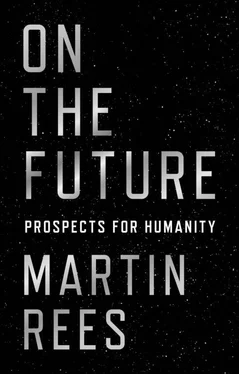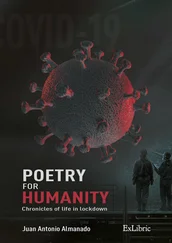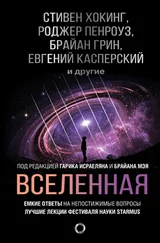—ABRAHAM LOEB, Harvard University
“In this outstanding book, the always brilliant Martin Rees addresses the key problems of our day, putting humanity’s perils and prospects in perspective—from climate change, to the future of artificial intelligence, to the threat of bioterrorism, to the chance for future space adventurers to spread out into the universe. Rees is one of the deepest and clearest thinkers on these subjects, and his book sparkles with gems of insight and humor.”
—J. RICHARD GOTT, coauthor of
Welcome to the Universe
“In this short and mighty book, Rees grapples with the exhilarating promise and frightening possibilities of today’s vast scientific advancements, situating himself somewhere between the techno-optimists and dystopian naysayers. On the Future provides tremendous insight into science’s great expanse and beseeches us all to get involved and advocate for long-term policies that will keep future generations safe. The future of humanity and the planet rests in our hands.”
—RACHEL BRONSON, president and CEO of the
Bulletin of the Atomic Scientists
“ On the Future will captivate readers. Martin Rees stands at the top of our informed thinkers about futurology.”
—PEDRO G. FERREIRA, author of
The Perfect Theory: A Century of Geniuses and the Battle over General Relativity
“This inspiring and thought-provoking book by one of the world’s leading scientists and visionaries is a must-read for anyone who cares about the future of humanity.”
—MAX TEGMARK, author of
Life 3.0: Being Human in the Age of Artificial Intelligence
“Our planet is in peril—and humanity needs huge doses of wisdom to save it. Fortunately, one man, Martin Rees, can provide it. This book is a must-read for all who care about our planet’s future.”
—KISHORE MAHBUBANI, author of
Has the West Lost It?
“Martin Rees’s book is a vital compass to help us navigate the future, an enthralling love letter to knowledge and rationality, and a call to arms for those of us who dare to hope for the best.”
—DAVID PUTTNAM, film producer and educator
“Martin Rees’s On the Future is a template of hope that offers practical scientific, social, and political solutions for avoiding man-made disasters that could devastate our species.”
—MICHAEL WILSON, film producer
Copyright © 2018 by Princeton University Press
Published by Princeton University Press
41 William Street, Princeton, New Jersey 08540
6 Oxford Street, Woodstock, Oxfordshire OX20 1TR
press.princeton.edu
Jacket image courtesy of Alamy Stock Photo
Extracts from The Reith Lectures: Scientific Horizons (first broadcast on BBC Radio 4 in June 2010) are used with permission of BBC.
All Rights Reserved
Library of Congress Control Number 2018935643
ISBN 978-0-691-18044-1
British Library Cataloging-in-Publication Data is available
This book has been composed in Adobe Text Pro and Refrigerator Deluxe
Printed on acid-free paper. ∞
Printed in the United States of America
10 9 8 7 6 5 4 3 2 1
The Earl of Birkenhead, The World in 2030 AD (London: Hodder and Stoughton, 1930).
Martin Rees, Our Final Century (London: Random House, 2003). The US edition (published by Basic Books) was retitled Our Final Hour .
H. G. Wells’s lecture, ‘The Discovery of the Future’, was given at the Royal Institution, London, on January 24, 1902, and subsequently was published in a book with that title.
‘Resilient Military Systems and the Cyber Threat’, Defense Science Board Report January 2013. Similar concerns have been reiterated by General Petraeus and other senior US figures.
The 2017 revision of the UN ‘World Population Prospects’ quotes a best estimate of 9.7 billion for the 2050 population. Another authoritative source is the Population Project of the International Institute for Applied Systems Analysis (IIASA), which estimates somewhat lower figures.
There are many reports on world food and water supplies—for instance, the 2013 report ‘Modelling Earth’s Future’, jointly prepared by the Royal Society and the National Academy of Sciences.
‘Our Common Future’, Report from the UN World Commission on Environment and Development, 1987.
Juncker’s remark is quoted in the Economist , March 15, 2007.
The ‘planetary boundaries’ concept was spelled out in a 2009 report from the Stockholm Resilience Centre.
This quote is from E. O. Wilson’s The Creation: An Appeal to Save Life on Earth (New York: W. W. Norton, 2006).
The conference, on May 2–6, 2014, was titled ‘Sustainable Humanity, Sustainable Nature: Our Responsibility’, and was cosponsored by the Pontifical Academy of Sciences and the Pontifical Academy of Social Sciences.
The quote is from Alfred Russel Wallace, The Malay Archipelago (London: Harper, 1869).
The Skeptical Environmentalist was published by Cambridge University Press in 2001. The Copenhagen Consensus, founded in 2002, is under the auspices of the Environmental Assessment Institute in Copenhagen.
The scientists involved in this project include C. Kennel at the University of California–San Diego, in La Jolla, and Emily Shuckburgh and Stephen Briggs in the United Kingdom.
The Stern Review Report on Economics of Climate Change, HM Treasury, UK, 2006.
G. Wagner and M. Woltzman, Climate Shock and the Economic Consequences of a Hotter Planet (Princeton, NJ: Princeton University Press, 2015).
W. Mischel, Y. Shoda, and M. L. Rodriguez, ‘Delay of Gratification in Children’, Science 244 (1989): 933–38.
‘Cuba’s 100-Year Plan for Climate Change’, Science 359 (2018): 144–45.
In the United Kingdom the case for the circular economy has gained traction through the advocacy of a widely admired high-profile figure, the around-the-world sailor Ellen MacArthur.
An excellent survey of geoengineering is Oliver Morton, The Planet Remade: How Geoengineering Could Change the World (Princeton: NJ: Princeton University Press, 2016).
Robert Boyle’s archives, and this document in particular, are discussed by Felicity Henderson in a 2010 Royal Society Report.
This list can be found online at https://www.telegraph.co.uk/news/uknews/7798201/Robert-Boyles-Wish-list.html.
Two highly accessible books on these developments are Jennifer A. Doudna and Samuel S. Sternberg, A Crack in Creation (Boston: Houghton Mifflin Harcourt, 2017) (Jennifer Doudna is one of the inventors of CRISPR/Cas9); and Siddhartha Mukherjee, The Gene: An Intimate History (New York: Scribner, 2016).
The paper, by D. Evans and R. Noyce of the University of Alberta, is in PLOS One and is discussed in Science News on January 19, 2018. Ryan S. Noyce, Seth Lederman, and David H. Evans, ‘Construction of an Infectious Horsepox Virus Vaccine from Chemically Synthesized DNA Fragments’, PLOS One (January 19, 2018): https://doi.org/10.1371/journal.pone.0188453.
Читать дальше


![Мартин Рис - Всего шесть чисел. Главные силы, формирующие Вселенную [litres]](/books/414169/martin-ris-vsego-shest-chisel-glavnye-sily-formir-thumb.webp)









